Freedom Writers
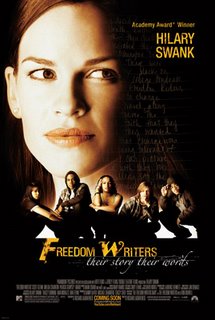 For an early January release that covers well-tread territory, Freedom Writers is surprisingly effective in a lot of ways. It's well made, it contains a bright cast of young newcomers, and it definitely has a couple moments that successfully pluck the heart strings. For everything it does right, the film still cannot escape the entire sense that we've seen it all before, nor can it escape the fact that everything seems all too neat and pat in the end. The movie overly glorifies its lead heroine, whereas her opposition are portrayed in such a negative light that the movie hardly seems to be playing fair. While the film is admirable, it just can't come together into a completely satisfying whole.
For an early January release that covers well-tread territory, Freedom Writers is surprisingly effective in a lot of ways. It's well made, it contains a bright cast of young newcomers, and it definitely has a couple moments that successfully pluck the heart strings. For everything it does right, the film still cannot escape the entire sense that we've seen it all before, nor can it escape the fact that everything seems all too neat and pat in the end. The movie overly glorifies its lead heroine, whereas her opposition are portrayed in such a negative light that the movie hardly seems to be playing fair. While the film is admirable, it just can't come together into a completely satisfying whole.  When spunky new teacher Erin Gruwell (Hilary Swank) enters Woodrow Wilson High School to teach Freshman and Sophmore English, she has no true idea what she's in for. Located in Long Beach, the local area is still feeling the after effects of the 92 Rodney King verdict when Erin enters the school in the fall of 94. She quickly learns that the students separate themselves, mainly staying with their own ethnic groups, and view one another as the enemy in a senseless gang war that carries from the streets into the classroom. Erin knows she could open some eyes if she had the proper resources, but no one at the school believes in the students or in her ideas. She decides to take matters into her own hands, taking various part time jobs to purchase proper English books and field trips to help her students realize that they are not alone in the pain they are experiencing. She also helps the students express their hopes, fears, and dreams by instituting a journal entry assignment that each student must fulfill, writing about their daily lives or their feelings. The writings and the class environment inspire the students to do more than they thought possible, and help them realize that despite their different backgrounds and ethnicity, they are very much the same.
When spunky new teacher Erin Gruwell (Hilary Swank) enters Woodrow Wilson High School to teach Freshman and Sophmore English, she has no true idea what she's in for. Located in Long Beach, the local area is still feeling the after effects of the 92 Rodney King verdict when Erin enters the school in the fall of 94. She quickly learns that the students separate themselves, mainly staying with their own ethnic groups, and view one another as the enemy in a senseless gang war that carries from the streets into the classroom. Erin knows she could open some eyes if she had the proper resources, but no one at the school believes in the students or in her ideas. She decides to take matters into her own hands, taking various part time jobs to purchase proper English books and field trips to help her students realize that they are not alone in the pain they are experiencing. She also helps the students express their hopes, fears, and dreams by instituting a journal entry assignment that each student must fulfill, writing about their daily lives or their feelings. The writings and the class environment inspire the students to do more than they thought possible, and help them realize that despite their different backgrounds and ethnicity, they are very much the same.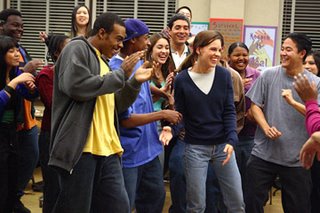 Freedom Writers tells a story that has been told numerous times, but at least it tells it somewhat better than the norm. That's because writer-director Richard LaGravanese takes a somewhat honest and gritty approach to the material. While the movie has more than its share of inspirational heart-tugging moments, the movie never feels overly sappy or manipulative. The movie never shies away from the violence or sadness, which surprised me considering that the film has been given a PG-13 rating, which initially led me to think the film would be whitewashed for public consumption. Though there is always a glimmer of hope, the film wisely does not completely forget about where the students come from or the world around them. We get a true sense of the struggles, not just of the children, but of Erin herself, whose ideas make her stand out amongst the rest of the school's faculty and even her family, who feel she is spending too much time with children who have no future. It is because of the film's somewhat harsh tone that makes the uplifting moments actually uplifting. We feel like the characters have earned them. When the students read The Diary of Anne Frank and actually manage to meet the real life Miep Gies (the woman who hid the Frank family, who is portrayed in this film by Pat Carroll), it is a touching and powerful moment, not only because of what the meeting means to the students, but because of what they go through to make the meeting a reality. It is also touching when we hear the words of the students that they write in their journals. Not only because we hear the actors reciting the actual words of the real-life students, but because the film is able to present their words to us through voice overs or semi-fantasy sequences where we see the students standing in a spotlight, reciting their words to us. The students are not just urban cliches, but three dimensional characters, and these sequences help flesh them out. Compare this to the one-note jive-talking puppets that populate the terrible Stomp the Yard.
Freedom Writers tells a story that has been told numerous times, but at least it tells it somewhat better than the norm. That's because writer-director Richard LaGravanese takes a somewhat honest and gritty approach to the material. While the movie has more than its share of inspirational heart-tugging moments, the movie never feels overly sappy or manipulative. The movie never shies away from the violence or sadness, which surprised me considering that the film has been given a PG-13 rating, which initially led me to think the film would be whitewashed for public consumption. Though there is always a glimmer of hope, the film wisely does not completely forget about where the students come from or the world around them. We get a true sense of the struggles, not just of the children, but of Erin herself, whose ideas make her stand out amongst the rest of the school's faculty and even her family, who feel she is spending too much time with children who have no future. It is because of the film's somewhat harsh tone that makes the uplifting moments actually uplifting. We feel like the characters have earned them. When the students read The Diary of Anne Frank and actually manage to meet the real life Miep Gies (the woman who hid the Frank family, who is portrayed in this film by Pat Carroll), it is a touching and powerful moment, not only because of what the meeting means to the students, but because of what they go through to make the meeting a reality. It is also touching when we hear the words of the students that they write in their journals. Not only because we hear the actors reciting the actual words of the real-life students, but because the film is able to present their words to us through voice overs or semi-fantasy sequences where we see the students standing in a spotlight, reciting their words to us. The students are not just urban cliches, but three dimensional characters, and these sequences help flesh them out. Compare this to the one-note jive-talking puppets that populate the terrible Stomp the Yard.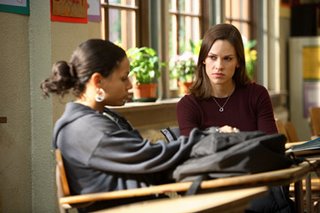 While the film reaches beyond the norms of the genre's cliches in many ways, it can't help but fall into a few traps. This is what ultimately holds Freedom Writers back from being an all-out success. While Erin and her students are handled in a somewhat realistic and three dimensional light, everyone outside of the classroom seem to be jerks who are so narrow-minded they're almost laughable. The entire faculty staff of the high school stand against Erin no matter what she does, what she proves, or what she tells them. It's almost as if they've been pre-programmed to agree against anything she says, and do so in such a way that it comes across as forced. These characters are portrayed as stuck up villains who won't hear a single thing Erin or her students have to say. If these characters were portrayed in a somewhat more realistic light, or at least if we got to know a bit more about them, their fears or why they have such a hard time believing Erin and her students can succeed, it would have been a bit easier to swallow. Instead, they are portrayed as melodramatic villains that the audience is supposed to boo and hiss each time they walk onto the screen. Even Erin's family (consisting of her husband, played by Patrick Dempsey, and her father, portrayed by Scott Glenn) seem strangely against everything Erin tries to do without even trying to understand, at least until near the end, when the father gives her an encouraging speech that seems tacked on considering everything that came before this scene. Erin also comes across as a bit too good. She's always got a sunny disposition and outlook on life, she's got this can-do spirit that's so strong I highly doubt anything could break it, and I really think the movie tries too hard to overly-sanctify her to the point that she sometimes doesn't seem like a real person. I don't know, maybe I'm wrong, and the real-life Erin Gruwell is actually like this. If she is, I'd like to know her secret as to how she stays so positive all the time, as the way Swank plays her, she's practically a ray of sunshine in human form.
While the film reaches beyond the norms of the genre's cliches in many ways, it can't help but fall into a few traps. This is what ultimately holds Freedom Writers back from being an all-out success. While Erin and her students are handled in a somewhat realistic and three dimensional light, everyone outside of the classroom seem to be jerks who are so narrow-minded they're almost laughable. The entire faculty staff of the high school stand against Erin no matter what she does, what she proves, or what she tells them. It's almost as if they've been pre-programmed to agree against anything she says, and do so in such a way that it comes across as forced. These characters are portrayed as stuck up villains who won't hear a single thing Erin or her students have to say. If these characters were portrayed in a somewhat more realistic light, or at least if we got to know a bit more about them, their fears or why they have such a hard time believing Erin and her students can succeed, it would have been a bit easier to swallow. Instead, they are portrayed as melodramatic villains that the audience is supposed to boo and hiss each time they walk onto the screen. Even Erin's family (consisting of her husband, played by Patrick Dempsey, and her father, portrayed by Scott Glenn) seem strangely against everything Erin tries to do without even trying to understand, at least until near the end, when the father gives her an encouraging speech that seems tacked on considering everything that came before this scene. Erin also comes across as a bit too good. She's always got a sunny disposition and outlook on life, she's got this can-do spirit that's so strong I highly doubt anything could break it, and I really think the movie tries too hard to overly-sanctify her to the point that she sometimes doesn't seem like a real person. I don't know, maybe I'm wrong, and the real-life Erin Gruwell is actually like this. If she is, I'd like to know her secret as to how she stays so positive all the time, as the way Swank plays her, she's practically a ray of sunshine in human form.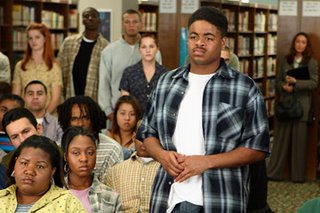 Despite the somewhat unbalanced characterizations, everyone is obviously doing the best they can. Hilary Swank's portrayal may be a bit too sunny and cheerful at times, but she never rings so false that we don't like her. She gets a couple good dramatic moments where she drops the sunny disposition, and actually gets to show some emotion. These scenes are when her performance is at its best, and she truly grabs our attention. The film has also gathered together a very good youth ensemble to play the students. While a few of them look a bit old to be high school freshman, it doesn't come across as being too awkward, so we're not constantly concentrating at how out of place the "students" seem. The main stand out amongst the students is former stand up comic April L Hernandez as troubled student Eva. She acts as the central narrator amongst the students, and her subplot about how she is torn between pride for her people and her new awakening to the world around her makes for some interesting dramatic moments throughout the film. The supporting cast outside of the classroom are mainly given thankless and underdeveloped roles, but they at least give it their all, and never come across as if they know they're stuck in a one-note role.
Despite the somewhat unbalanced characterizations, everyone is obviously doing the best they can. Hilary Swank's portrayal may be a bit too sunny and cheerful at times, but she never rings so false that we don't like her. She gets a couple good dramatic moments where she drops the sunny disposition, and actually gets to show some emotion. These scenes are when her performance is at its best, and she truly grabs our attention. The film has also gathered together a very good youth ensemble to play the students. While a few of them look a bit old to be high school freshman, it doesn't come across as being too awkward, so we're not constantly concentrating at how out of place the "students" seem. The main stand out amongst the students is former stand up comic April L Hernandez as troubled student Eva. She acts as the central narrator amongst the students, and her subplot about how she is torn between pride for her people and her new awakening to the world around her makes for some interesting dramatic moments throughout the film. The supporting cast outside of the classroom are mainly given thankless and underdeveloped roles, but they at least give it their all, and never come across as if they know they're stuck in a one-note role.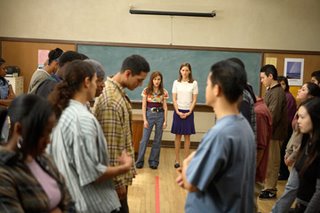 When all is said and done, Freedom Writers is a step above the norm in the slew of "eager young teacher inspires a group of angry inner-city school kids" films that Hollywood turns out every year. It probably could have gone even further with a screenplay that wasn't so one-sided. There's a lot of stuff to like here. The performances are sound, its well-directed, and the movie doesn't go for cheap sentiments and instead tries to earn the audience's admiration. Maybe it needed another rewrite or two for it to completely break free and join the best entries in the genre, such as Stand and Deliver. As it is, Freedom Writers will have to settle for being a very good effort that comes just short of being great.
When all is said and done, Freedom Writers is a step above the norm in the slew of "eager young teacher inspires a group of angry inner-city school kids" films that Hollywood turns out every year. It probably could have gone even further with a screenplay that wasn't so one-sided. There's a lot of stuff to like here. The performances are sound, its well-directed, and the movie doesn't go for cheap sentiments and instead tries to earn the audience's admiration. Maybe it needed another rewrite or two for it to completely break free and join the best entries in the genre, such as Stand and Deliver. As it is, Freedom Writers will have to settle for being a very good effort that comes just short of being great.See related merchandise at Amazon.com!






0 Comments:
Post a Comment
<< Home